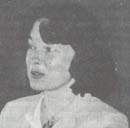Sully Taylor
(1971-72, 74-77)

When I graduated from SMU in Latin American history and English literature, all I wanted to do was teach and travel. The obvious choice was the Peace Corps, which in their infinite wisdom accepted me for service in the Corps-for South Korea! Since I spoke fluent Spanish, the odd job teaching English in Japan made about as much sense as my going to South Korea, and besides, it was only for a year. Such are the decisions of 22-year-olds.
The first year at LIOJ, I learned several things that have affected my life profoundly since. First was how to teach. Liz Lindley had been hired to whip the group of young American recruits into some sort of ESL faculty, and also to help create a solid ESL curriculum for LIOJ. The mandate, from what I heard, was to turn the school around or it was going to be shut down. Liz drilled us, and along with people like Ann Frentzen and Brian Stott, we cut pictures to illustrate the basic sentences from English 900 until our fingers were stained and our eyes crossed. Liz observed us in the classroom, offering harsh but helpful critiques. Her most valuable lesson was "leave your ego at the classroom door," a dictum I still remind myself of to this day. To relieve the stress, we would party on a regular basis, and one of my most fun times was conniving with Masa Shibusawa on parties for special events, such as the good-bye party for Liz when she went to join her fiance in Thailand. Mr. Harker would take the teachers on "death marches" across the hills, events I heard of since I usually stayed behind at LIOJ and hung out with Terttu, listening to stories of Up with People and other bits of lore of the roots of LIOJ.
Another thing that impressed me that first year and shook up my ideas was to discover that Japanese businessmen actually liked their companies and that Japanese companies seemed to create a different working environment than American companies. Coming out of the sixties, where anyone who even entered the business school building on campus was considered both a nerd and of the extreme right, it was provocative to see the business world and management from such a different perspective.
The other key learning from that first year at LIOJ was that I was not as culturally savvy as I thought. Having grown up in places like New York and London, and spent eight years in Mexico, I considered myself fairly cosmopolitan, able to move easily between cultures. Japan proved to be a shock, largely because I was so unprepared and ignorant of its history and culture, in particular the whole concept of in-group (wareware Nihonjin) and out-group (gaijin). Whereas Mexicans liked to claim you as one of their own as soon as you were able to drink tequila or dance the cumbia-a triumph of Mexican culture over American, in their view-Japanese were much more reserved about bestowing honorary Japan-hood on anyone, let alone an upstart, young, non-Japanese speaking American girl who still struggled with the concept of the Meiji Restoration. In realizing how complex, difficult, and varied successful adaptations to other cultures can be, Japan gave me an intense interest in helping others to avoid the extremes of pain I went through that first year, and in particular, permanent negative feelings that can arise as a result.
I returned to LIOJ in 1974, after an MAT from the School for International Training, and taught for three more years at LIOJ. Bill Harshbarger, who I had met at SIT and married in 1974, became Director of the school after we returned from our honeymoon! Rowland and Terttu were off to Iran, wanting a final adventure before retirement (and boy, did they get one when the Iranian Revolution exploded a year later). Being "The Director's Wife" was a different vantage point, and while not as much fun because of a certain distance it created, it was interesting because I was privy to the intercultural issues the director had to face as an administrator. This began to turn my interest more and more toward the interaction of people from different cultures working together in a business setting. What finally jelled my passion in this area was a remark that Bill recounted to me that first year, from a business professor from Scandinavia. The essence of the remark was that growth in intercultural understanding and the hope for world peace that might issue from it were more likely to happen in multicultural, multinational workplaces than in organizations like the United Nations. It was my first awareness of the potential positive power of the globalization of business, and eventually led me to a Ph.D. in International Human Resource Management.
Besides changing my worldviews on a number of dimensions, LIOJ has also provided me with some of the dearest and closest friends in my life. Elena and Roger, who I met in 1974, and who later took over directing the school when Bill and I left in 1977, have remained very close friends, and their children are very special to me. Bob Hazen, who I met during that period but only later got to know when he moved to Portland in the nineties, is like a brother to me. Jan Gallagher (MacDougall) has remained a very good friend, and Elena and Jan and I take a yearly trip together that re-cements the ties of friendship started then. Of course there are Japanese friends, such as the Shibusawas. Masa taught several courses at Portland State University where I now teach, and having Chako and Masa in Portland was a great delight. And there are the Akiyamas, who I got to know when I taught Spanish at Yuasa Battery.
June 2002
Top |
Copyright (c) Language Institute of Japan (LIOJ) / 日本外語教育研究所 |  Back Back |